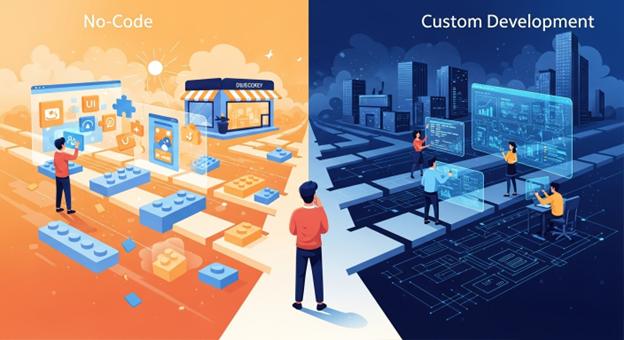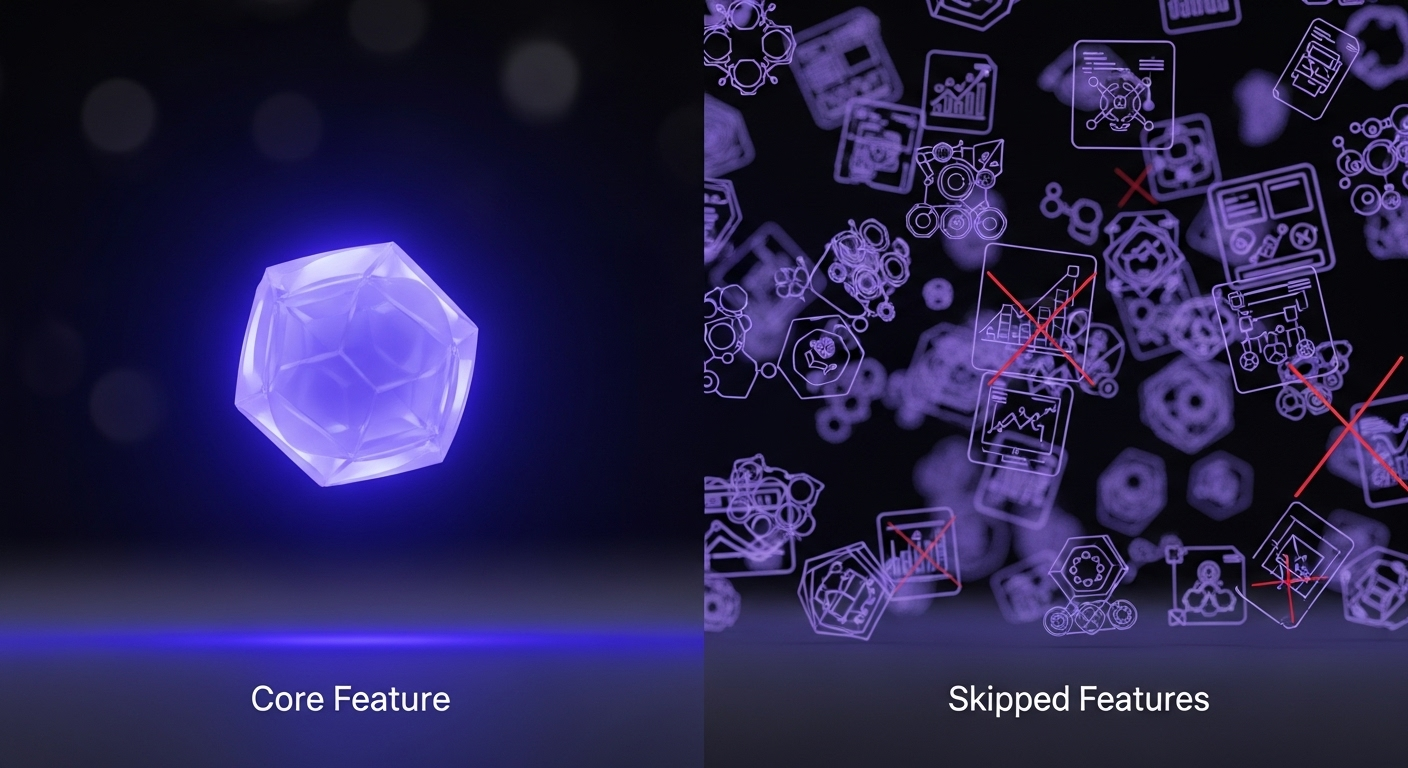No-Code vs. Custom Dev: Which Is Right for Your Startup in 2025?
Hey there, I’m Dillon Hughes. For the past three years, I've been immersed in the world of marketing and project management, navigating the space where technology meets business goals. I started from scratch, just like many of you, piecing together the skills that not only pay the bills but also feel right. Through my blog, I get to share the real, practical insights I've gathered to help you find your footing in the digital world without just chasing trends.
Today, we're tackling a big one. Can you really launch a fully functional app and get paying customers without writing a single line of code? Absolutely! The no-code movement has completely reshaped the landscape for entrepreneurs, making it possible to build and validate ideas at a speed that was once unimaginable. Did you know that the global no-code development platform market is expected to surge to nearly $94 billion by 2029? That's a massive shift in how we think about technology and innovation!
But does this mean custom development is a thing of the past? Not so fast. The classic approach of building software from the ground up still holds immense power. For your startup, the choice between no-code and custom dev isn't just a technical decision; it's a strategic one that will impact your budget, your timeline, and your ability to scale. So, let's break it all down and figure out which path is the perfect launchpad for your vision in 2025!
Key Takeaways
No-Code: The best choice for speed, low cost, and validating ideas (MVPs). Perfect for non-technical founders and early-stage startups needing to get to market fast and on a tight budget.
Custom Dev: The right path for startups with unique, complex features, long-term scalability needs, and the necessity for full control over intellectual property and security.
The Choice: Your decision depends entirely on your immediate priorities. Need to test the waters? Go no-code. Building a technological fortress? Go custom. It's not a lifelong commitment; you can always start with no-code and evolve.
So, What Exactly Is No-Code Development?
Let's demystify this 'no-code' thing. At its heart, no-code development is about one thing: empowerment. It's a software development approach that allows people without any programming skills to build and deploy their own applications. Instead of a blank screen waiting for lines of Python or JavaScript, you get a visual, drag-and-drop interface. You’re essentially piecing together pre-built, functional blocks to create a final product. This revolution has given rise to the 'citizen developer'—a business user who can now build the tools they need without waiting on an already-overburdened IT department.
- Defining the Revolution: We'll explain what 'no-code' truly means and how it empowers non-technical founders to build sophisticated applications using visual interfaces.
- Meet the Platforms: The no-code world is a universe of powerful tools. Platforms like Bubble are fantastic for building complex, full-stack web apps like marketplaces or social networks. Webflow is a designer's dream for creating visually stunning, high-performance websites. For mobile apps, tools like Adalo and Glide let you turn a spreadsheet into a functional mobile app in no time. And for automating workflows between different apps, tools like Zapier and Make are indispensable.
- What Can You Build?: You’d be shocked. People have built entire businesses, from subscription-based service marketplaces to internal inventory management systems and customer-facing web apps, all without touching code.
- Busting the Myths: The biggest myth is that no-code is just for simple landing pages. While it's great for that, modern no-code platforms can handle databases, user accounts, API integrations, and payment processing. They are serious tools for serious businesses.
The Enduring Power of Custom Development
Now, let's not get ahead of ourselves and declare coding dead. Custom software development, the traditional method of hiring developers to write a unique codebase from scratch, remains as crucial as ever. This is the bespoke, tailor-made suit of the software world.
- Back to Basics: Custom development is the process of designing, creating, deploying, and maintaining software for a specific set of users or functions. It involves a full software development lifecycle and a team of skilled engineers.
- When Custom is King: There are clear scenarios where custom development is the only option. If your app involves proprietary algorithms, needs to process massive amounts of data in real-time, requires deep integration with unique hardware, or has highly specific security and compliance needs (like in fintech or healthcare), you need to go custom.
- The Benefits of Bespoke: The primary advantage is creating a solution perfectly tailored to your needs. You have complete ownership of the intellectual property, which is a massive asset. The software is built to integrate perfectly with your existing systems and workflows.
- Building a Moat: A truly unique, custom-built application can be a powerful competitive advantage. It creates a 'moat' around your business that is incredibly difficult for competitors to replicate, giving you a defensible edge in the market.
The Ultimate Showdown: Speed, Cost, and Scalability
This is where the rubber meets the road for most startups. The decision between no-code and custom dev often comes down to a trade-off between these three critical factors.
- Speed to Market: No-code wins this race, and it's not even close. You can go from idea to a Minimum Viable Product (MVP) in a matter of weeks, sometimes even days. This allows for rapid prototyping and getting invaluable user feedback almost immediately. Custom development is a marathon, not a sprint. A well-built custom app can take several months to over a year to launch.
- The Money Talk: The cost difference is staggering. No-code platforms typically operate on a subscription model that can cost a few hundred dollars per month. Building a custom app is a significant capital investment. Hiring developers or an agency can cost anywhere from $50,000 to well over $300,000, depending on the complexity. No-code can reduce development costs by up to 80% or more.
- Can It Grow With You?: This is the most nuanced comparison. Historically, scalability was seen as no-code's Achilles' heel. While many no-code apps can handle hundreds of thousands of users without issue, a key benefit of using a no-code platform is that their teams are dedicated to managing the security and infrastructure for you. However, for applications expecting millions of users or with extreme performance requirements, a custom solution built with scalability in mind from day one offers more robust and predictable performance. The key is understanding that scalability is about more than just user numbers; it's also about database complexity and workflow efficiency, which can be optimized in no-code environments.
Flexibility & Control: How Much Do You Really Need?
Your choice also hinges on how much control you need over the final product and its features.
- The Freedom of No-Code: Modern no-code platforms offer a surprising amount of flexibility. Through extensions, plugins, and API integrations, you can connect to countless other services and build very complex functionalities. The degree of customization is often more than enough for a vast majority of web and mobile applications.
- Knowing the Boundaries: The trade-off for speed and simplicity is that you operate within the platform's ecosystem. You are ultimately limited by the features the no-code provider makes available. If you need a completely novel feature or want to control the underlying code for optimization, you'll hit a ceiling.
- Your Vision, Your Rules: Custom development offers complete and total control. If you can dream it (and afford it), your development team can build it. There are no platform limitations holding you back. This is essential for companies whose core value proposition is tied to a unique technological innovation.
- Making the Right Trade-Offs: Every founder must balance their grand vision with the practical realities of their startup journey. Is that one-of-a-kind feature truly essential for your MVP, or can you test your core hypothesis with a slightly more standardized solution first? Often, the answer is to start with the faster, cheaper option and iterate based on real-world feedback.
Conclusion
So, in the epic battle of no-code versus custom development, who wins? The answer is... your startup! There is no single right answer, only the right answer for you, right now.
If you need to test an idea, launch an MVP, and get crucial user feedback with lightning speed and a lean budget, no-code is your undisputed champion. It's the ultimate tool for product validation and achieving market agility. However, if your business is built on a foundation of unique technology, requires complex integrations, and you're planning for massive scale from day one, investing in a custom-built solution is the strategic, long-term play.
The best part? This isn't a life sentence. Many of the most successful startups today began with a no-code or low-code app to prove their concept and then 'graduated' to a custom solution once they had product-market fit and funding. The important thing is to understand the trade-offs, choose the tool that removes the most friction for you today, and most importantly, get building. What's the first thing you're going to bring to life?
Frequently Asked Questions (The Simple Answers)
No-code development uses visual, drag-and-drop platforms to build applications without writing any code. Custom code (or custom development) involves skilled developers writing a program from scratch using programming languages, offering limitless possibilities but at a higher cost and longer timeline.
They are essentially the same as the comparison above. 'Traditional development' is just another term for custom code development, where programmers build software using languages like Python, Java, or C++. No-code abstracts this entire process away, allowing non-programmers to build applications visually.
No, no-code will not replace developers. While no-code empowers more people to build simpler applications and automates repetitive tasks, developers are still essential for complex, highly-customized, and large-scale software projects that require deep technical knowledge, security, and performance optimization. Instead, it's changing their role, allowing them to focus on more innovative and complex challenges.
The primary limitations of no-code platforms are restricted customization, potential scalability concerns for very high-traffic apps, and vendor lock-in, where you are dependent on the platform's features, infrastructure, and pricing. You might hit a wall if you need a truly unique feature that the platform doesn't support.
This is a bit of an outlier, but an important one to clarify! A 6-digit customs code, officially known as a Harmonized System (HS) code, is a standardized international system for classifying globally traded products. It's used by customs authorities worldwide to determine tariffs and taxes on goods and has nothing to do with software development.
No-code development is a method that allows anyone, especially non-technical users, to create applications through a graphical user interface instead of writing traditional code. Think of it like building with digital LEGO blocks, you use pre-built components and visual workflows to assemble a fully functional app.
This is the core of our discussion. 'No-code' offers speed and low cost through visual builders, making it accessible to everyone. 'Code' (custom development) offers ultimate power, flexibility, and scalability but requires significant time, money, and technical expertise.
These are two different tools for writing code (custom development). Visual Studio Code (VS Code) is a modern, highly extensible code editor that supports a vast range of languages and frameworks like JavaScript, Python, and C++. Dev-C++ is a more dated Integrated Development Environment (IDE) that primarily focuses on C and C++. Generally, VS Code is considered more versatile and powerful due to its massive extension ecosystem and active community support.
A non-code app is simply an application built using a no-code platform. From a user's perspective, it looks and feels like any other app. The difference is in its creation—it was assembled with visual tools rather than being programmed line by line. Examples include internal business tools, customer portals, marketplaces, and mobile apps.
Custom-developed code is software that is designed, created, and maintained to meet the specific, unique needs of a business. Unlike off-the-shelf software, it is built from the ground up by developers to solve particular problems or provide a competitive advantage, offering tailored security, scalability, and features.



